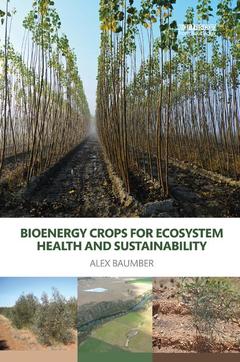Bioenergy Crops for Ecosystem Health and Sustainability Routledge Studies in Bioenergy Series
Auteur : Baumber Alex

The growing of crops for bioenergy has been subject to much recent criticism, as taking away land which could be used for food production or biodiversity conservation. This book challenges some commonly-held ideas about biofuels, bioenergy and energy cropping, particularly that energy crops pose an inherent threat to ecosystems, which must be mitigated.
The book recognises that certain energy crops (e.g. oil palm for biodiesel) have generated sustainability concerns, but also asks the question "is there a better way?" of using energy crops to strategically enhance ecosystem functions. It draws on numerous case studies, including where energy crops have had negative outcomes as well as well as cases where energy crops have produced benefits for ecosystem health, such as soil and water protection from the cropping of willow and poplar in Europe and the use of mallee eucalypts to fight salinity in Western Australia. While exploring this central argument, the volume also provides a systematic overview of the socio-economic sustainability issues surrounding bioenergy.
Part 1: Introduction 1. Bioenergy Crops and Sustainability Part 2: Energy Cropping and Ecosystem Health 2. Bioenergy and Climate Change 3. Deforestation and Land Degradation 4. Ecological Restoration and Enhancement Part 3: Socio-economic Dimensions of Energy Cropping 5. Food Security 6. Land Rights and Community Impacts 7. The Economics of Energy Cropping Part 4: Moving Forward 8. Review of Policy Options 9. Case Studies: Australia and Brazil 10. Conclusion
Alex Baumber is a Postdoctoral Research Fellow and Sessional Lecturer in Interdisciplinary Environmental Studies at the University of New South Wales, Australia. He has previously worked for the Future of Australia’s Threatened Ecosystems (FATE) Program and for the Australian Government Department of Environment and Heritage, Sustainable Wildlife Industries Section.
Date de parution : 01-2019
15.6x23.4 cm
Date de parution : 03-2016
Ouvrage de 256 p.
15.6x23.4 cm
Thèmes de Bioenergy Crops for Ecosystem Health and Sustainability :
Mots-clés :
Life Cycle GHG Emission; cropping; EU’s Renewable Energy Directive; oil; Union’s Renewable Energy Directive; palm; EU Biofuel; mallee; EU Emission Trading Scheme; sustainable; International Land Coalition; international; Energy Cropping Systems; land; RSB Standard; coalition; Socio-economic Development; corn; Large Scale Land Acquisition; ethanol; San Standard; Sustainable Energy Cropping; Bioenergy Crops; Oil Mallee; Biofuel Feedstocks; Carbon Farming Initiative; Liquid Biofuels; Advanced Biofuels; Salinity Mitigation; Life Cycle Emissions; GHG Saving; SRC Crop; IEA Bioenergy; Large Scale Land Transactions; Soil Carbon



